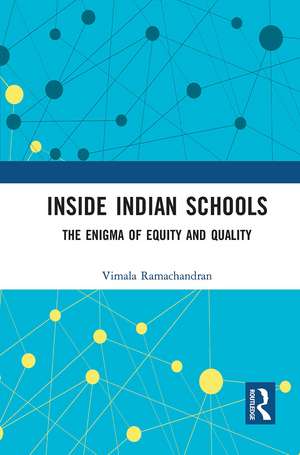Inside Indian Schools: The Enigma of Equity and Quality
Autor Vimala Ramachandranen Limba Engleză Paperback – 25 iun 2024
Please note: Taylor & Francis does not sell or distribute the Hardback in India, Pakistan, Nepal, Bhutan, Bangladesh and Sri Lanka.
Preț: 256.48 lei
Preț vechi: 324.67 lei
-21% Nou
Puncte Express: 385
Preț estimativ în valută:
49.08€ • 51.24$ • 40.62£
49.08€ • 51.24$ • 40.62£
Carte tipărită la comandă
Livrare economică 04-18 aprilie
Preluare comenzi: 021 569.72.76
Specificații
ISBN-13: 9781032653396
ISBN-10: 1032653396
Pagini: 292
Dimensiuni: 152 x 229 mm
Greutate: 0.28 kg
Ediția:1
Editura: Taylor & Francis
Colecția Routledge
Locul publicării:Oxford, United Kingdom
ISBN-10: 1032653396
Pagini: 292
Dimensiuni: 152 x 229 mm
Greutate: 0.28 kg
Ediția:1
Editura: Taylor & Francis
Colecția Routledge
Locul publicării:Oxford, United Kingdom
Public țintă
PostgraduateCuprins
PART I THE BIG PICTURE 1. Introduction 2. Equity and Quality: Two Sides of the Same Coin 3. The Narrative Emerging from Different Data Sources 4. The Cumulative Burden of Exclusion of Tribal Communities 5. The Intermeshing of Gender and Equity in Education PART II BEHIND THE SMOKESCREEN OF DATA 6. Segregated Schools in an Unequal Society 7. What Facilitates Successful Primary School Completion? 8. What it Means to be a Dalit or Tribal Child in Our Schools 9. The Teacher Conundrum
Notă biografică
Vimala Ramachandran is an educationist who lives in Delhi, India. She was involved in the conceptualization of Mahila Samakhya (Education for Women's Equality and established the Education Research Unit (now known as ERU Consultants Private Limited) in 1998. Her books include The Elementary Education System in India: Exploring Instutional Structure, Processes and Dynamics and Hierarchies of Acces: gender and Equity in Primary Education.
Descriere
In this volume the author explores the contours of a school system that is facing a crisis of legitimacy. While India aspires to march towards a knowledge driven society & economy, millions of young people are left behind. Those who can afford march out of government schools only to realize that the private schools are no better. The schools
